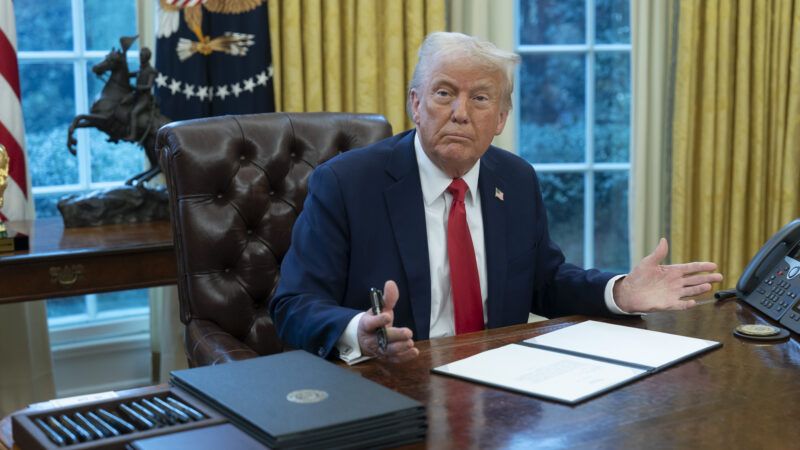Trump's Theory of Tariffs Makes No Sense
We can tax our way to prosperity, Trump claims, but we'll just…not do that, I guess?

For weeks, President Donald Trump has been telling Americans that his plan to impose high tariffs on the country's top trading partners would usher in an era of prosperity not seen in well over 100 years.
"The tariffs are going to make us very rich and very strong," Trump said Friday. "They don't cause inflation. They cause success." The president has been using variations on this same argument for months (for years, actually). They are "going to make us rich," he said in December. "In the 1890s, our country was probably the wealthiest it ever was because it was a system of tariffs," he said last year on the campaign trail.
This is bullshit, by the way. The high tariffs that America imposed during the late 19th century did not make America rich and did not make American manufacturing strong. It's also absurd to claim that the country was at its wealthiest in an era when most people did not have access to indoor plumbing, electricity, or modern medical care—and when the average person was, objectively, much poorer.
But leave all that aside for a moment. Let's assume that Trump sincerely holds this belief: that tariffs are a wealth-generating tool, and that their implementation will return the country to its proper place as the wealthiest, most successful, most respected nation on the planet.
If all that's true, then how to explain what Trump did this morning?
"President Donald Trump held off Monday on his tariff threats against Mexico for one month of further negotiations after Mexican President Claudia Sheinbaum agreed to send 10,000 members of her country's national guard to the border to address drug trafficking," the Associated Press reported.
Wait, what happened to endless prosperity and success? If tariffs are as great as Trump says they are, he should be implementing them no matter what the leaders of any other silly little countries say or do. We can tax our way to prosperity, Trump claims, but we'll just…not do that, I guess?
That's the problem with Trump's theory about tariffs. Either tariffs are an inherently good and prosperity-generating policy that enriches America, or they are a threat to get other countries to do as Trump says. Both things can't be true.
If the former, then why would Trump forgo all those billions of dollars that could be collected off Mexican imports simply because Mexico agreed to make a few small changes to how it polices the border? We were going to offset the income tax with tariffs, Trump promised. But now? Nah, Mexico's president said she would make a few border guards work overtime, so we'll just forget about that idea.
If the latter, then tariffs are something to be feared—a stick with which to compel the behavior of other, smaller countries—that comes with some pain for Americans, as Trump admitted in a post on Truth Social over the weekend. But if that's what they are, and they can be removed as soon as those other countries comply with Trump's wishes, then it seems like the tariffs were never intended to produce the prosperity that Trump promised.
In short, Trump is either a bad dealmaker or a liar.
That's not a conclusion that's drawn by reviewing the piles of available evidence about the effectiveness or the cost of tariffs. It's not a conclusion based on the opinions of the scores of economists who say Trump's trade war is a foolish, counterproductive move.
It's a conclusion drawn solely from the contradictory arguments that Trump is making as he threatens to start a continent-wide trade war.
Intellectual consistency is obviously not one of Trump's strengths, but his advisors and the media should demand an answer: Does the president sincerely believe that tariffs are a pathway to prosperity, as he has been claiming for months? Or was all that a lie, because tariffs are actually a punitive, destructive tool of foreign policy?
They cannot be both.


Show Comments (178)